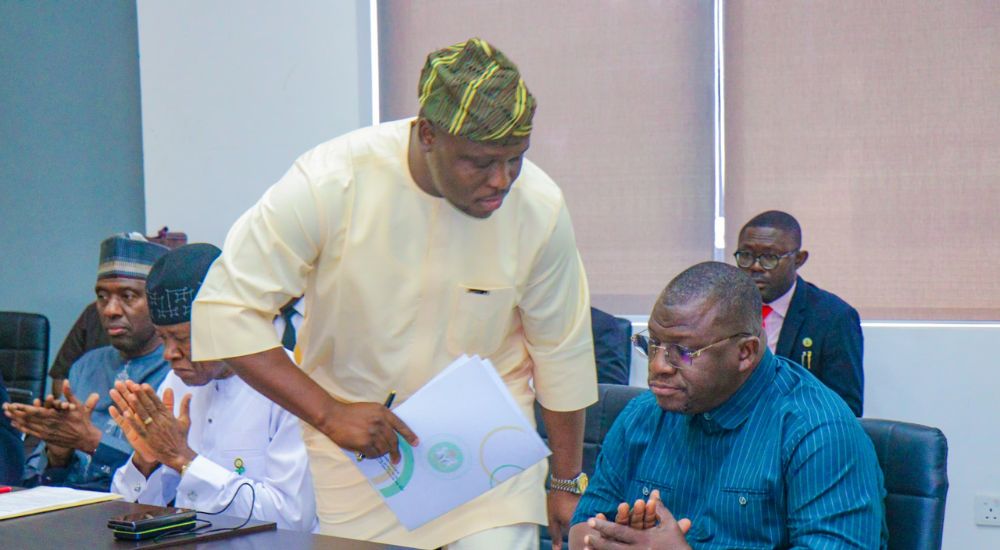Nigeria’s Bank Of Agriculture Needs Complete Overhaul — Dr. Steve Ogidan

Dr. Steve Ogidan, a Distinguished Member of the National Institute (Mni), is the Managing Director of Successory Nigeria Ltd. He previously served as Head of Planning and Development at the Bank of Agriculture and currently consults for various international development organisations, including FAO, IFAD, and the World Bank on agricultural finance in Sub-Saharan Africa. He recently led the Team that designed the Angola Youth Empowerment Project for the African Development Bank.
In this exclusive interview with THE WHISTLER, he shares his insights on the challenges facing the 53-year-old institution and offers recommendations for the newly appointed Managing Director, Mr Ayo Sotinrin.
Dr. Ogidan, who spent over two decades at the Bank before becoming a consultant to international development partners on agricultural development, speaks candidly about what it would take to transform the Bank into an effective contributor to Nigeria’s food security system. Dr Ogidan is the author of Enhancing Food Security in Nigeria Through Agricultural Development Programmes:
Excerpts:
Dr. Ogidan, congratulations on your continued success in the agricultural development sector. The President recently appointed a new Managing Director for the Bank of Agriculture. What are your thoughts on this appointment?
Thank you. This appointment is critical for the Bank and Nigeria’s agricultural sector. The BOA has unfortunately been underperforming for many years, and this leadership change presents a vital opportunity for transformation. The new Managing Director inherits significant challenges but also the chance to make a lasting impact on our nation’s food security.
You spent over 20 years at the Bank of Agriculture. You came in from the Former People’s Bank as Head of Strategy and worked in BOA after the merger; in your assessment, what are the main challenges that have prevented the institution from fulfilling its mandate?
The Bank has been plagued by four fundamental issues. First, poor management practices are characterized by political interference in lending decisions, lack of accountability, and opaque transparency. Second, woefully outdated technology has limited its reach to rural farmers and hampered operational efficiency. Third, a workforce with limited capabilities in modern agricultural financing techniques. And fourth, inadequate funding mechanisms have restricted the Bank’s ability to support Nigeria’s agricultural potential. These issues didn’t develop overnight—they resulted from decades of neglect and misalignment with evolving agricultural finance best practices. I was privileged to be the Team Leader for an unprecedented three terms for the FGN-IFAD-RUFIN Supervision Missions for Nigeria. During these Missions, our reports underscored the need to grant absolute autonomy to the BOA in its agricultural financing. We also recommended the deployment of appropriate technology. Finally, in line with what we designed and implemented for Juhudi Kilimo in Kenya; we recommended a special window for smallholders’ farmers in the bank. Today, Juhudi Kilimo is the largest African microfinance bank for farmers in Africa, while our BOA has continued to decline in fortune.
If you were to advise the new Managing Director, what would be your top recommendations?
I would recommend an eight-point agenda for transformation. First, conduct a comprehensive institutional diagnostic to understand current affairs. My experience suggests that prescribed solutions often miss the mark without an accurate diagnosis.
Second, implement fundamental governance reforms to ensure transparency and accountability. The era of treating the Bank as a political tool must end.
Third, prioritize technology modernization. During our consulting assistance to Angola, We designed a pilot project implementing mobile banking and geospatial technologies for Funds for Agricultural Development (FADA) in the provinces outside Luanda, demonstrating a 40% improvement in loan quality. This can be replicated in Nigeria with accurate farmers’ data.
Fourth, human capital can be transformed through comprehensive capacity building and strategic recruitment of specialists.
Fifth, innovate the product offerings to address the diverse needs of agricultural stakeholders across the value chain.
Sixth, establish strategic partnerships to leverage external capabilities and resources.
Seventh, implement robust risk management frameworks specifically designed for agricultural financing.
And eighth, establish impact measurement systems to track progress and facilitate continuous learning.
Those are comprehensive recommendations. How would you advise the new MD to prioritize these initiatives?
Implementation should be carefully sequenced. The first 100 days should focus on institutional diagnostics, stakeholder engagement, and quick wins such as launching a rapid response loan programme for the upcoming planting season. This builds credibility and momentum.
The next phase, months 4-12, should prioritize governance reforms, technology upgrades, and staff capacity building. These create the foundation for sustainable change.
Year 2 should emphasize product innovation, strategic partnerships, and non-performing loan recovery. By year 3, the focus should shift to scaling successful interventions and measuring impact.
The Bank has struggled with non-performing loans for many years. How can this issue be addressed?
This is indeed a critical challenge. While examining the Bank’s Risk Management framework when I led the IFAD Mission there, I found that blanket recovery approaches rarely work. Instead, I recommended a segmented approach. Some loans can be restructured based on the borrower’s capacity to pay, others might require legal action, and some, unfortunately, may need to be written off. I also recommended that for big agricultural projects struggling, the Bank should invite the Turnaround Management Association Nigeria Chapter to help revive the distressed assets instead of outright liquidation.
More importantly, the Bank needs to address the root causes of non-performing loans: poor credit assessment, inadequate monitoring, and lack of technical support to borrowers. My team has led a programme that paired loans with agricultural extension services, which reduced default rates by nearly 30% in participating states. This kind of innovative approach is essential.
How important is technology in transforming the Bank?
Technology is absolutely central to the transformation agenda. The Bank’s technological systems are decades behind what’s available in the market today. Modern banking systems, mobile platforms, and agricultural intelligence tools can dramatically improve efficiency, reach, and impact. When my team launched the Farmers Business Radio in collaboration and partnership with the MTN, it became a huge success that we replicated in Mozambique. The stakeholders on agriculture in Mozambique were sponsored to Nigeria by the FAO to understudy our modest efforts in 2024. The Honourable Minister for Budget and Economic Development, Senator Abubakar Atiku Bagudu, received the delegation in the spirit of South-South Collaboration. There are several technologies we could recommend.
For example, geospatial technologies for farm mapping and monitoring can transform risk assessment. Market intelligence platforms can guide the Bank’s decisions and farmers’ production planning. Digital channels can extend services to remote rural areas at a fraction of the cost of physical branches. However, technology adoption must be accompanied by process redesign and staff capacity building to be truly effective. Technology alone is not the answer—it’s a critical enabler.
What role should the Federal Government play in this transformation process?
The Government’s role is crucial in three specific areas. First, it must provide adequate capitalization—the Bank needs sufficient financial resources to fulfill its mandate effectively. Second, it must ensure operational autonomy—political interference in lending decisions has been a major contributor to the Bank’s challenges. Third, it must ensure policy alignment—ensuring that agricultural policies and programmes are coordinated with the Bank’s activities.
I would advise the new managing director to proactively engage with the Ministry of Agriculture and Food Security, the Ministry of Finance, Budget and Economic Development, and other relevant government agencies to secure the necessary support while maintaining operational independence. The BOA should learn from the Development Bank of Nigeria (DBN) on how to be professional while driving the government’s development agenda.
Climate change is increasingly affecting agricultural production. How should the Bank respond to this challenge?
Climate change represents both a risk and an opportunity for the Bank. On the risk side, changing weather patterns are already affecting agricultural productivity across Nigeria, increasing default risks in the loan portfolio. The Bank must integrate climate risk assessment into all lending decisions and develop specialized products that help farmers build resilience.
On the opportunity side, there’s growing international funding for climate-smart agriculture. The Bank could position itself as an intermediary for climate finance, accessing concessional resources that can be blended with commercial funds to create attractive financing packages for climate-resilient agricultural practices.
My team consulted on a project for IFAD in Nigeria, specifically the IFAD-Value Chain Development Programme (VCDP). The VCDP developed a climate-smart financing model that demonstrated promising results in terms of adaptation and improved yields. These are examples that could be replicated.
Finally, Dr. Ogidan, do you believe the Bank of Agriculture can be successfully transformed, given its troubled history?
I remain cautiously optimistic. The challenges are significant but not insurmountable. With the right leadership, adequate resources, and political will, the Bank can become an effective contributor to Nigeria’s food security.
During my years at the Bank, I witnessed pockets of excellence and innovation demonstrating what’s possible. Those were dwarfed by leadership’s limited foresight and lack of continuity. The task now is to scale these successes while addressing the fundamental institutional challenges. Smallholder farmers hold the key to Nigeria’s food security. In my recent book on Enhancing Food Security in Nigeria, published by the National Institute, Kuru, three key issues arose: First, putting the right to food for all at the heart of food systems transformation. Secondly, investing in young people’s capacities to be leaders in food systems transformation is important. Lastly, investing in sustainable, equitable, and resilient food systems ensures they offer viable and attractive livelihoods to young people. The BOA can be the champion in all three.
The stakes are high. Nigeria’s agricultural potential remains largely untapped, and our food security challenges are growing. A revitalized Bank of Agriculture could be pivotal in addressing these issues. What’s required is courage, vision, and persistence from the new leadership, combined with support from all stakeholders.
Thank you for these insights, Dr. Ogidan, mni.
Thank you for the opportunity to contribute to this important discussion.
Nigeria’s Bank Of Agriculture Needs Complete Overhaul — Dr. Steve Ogidan is first published on The Whistler Newspaper





